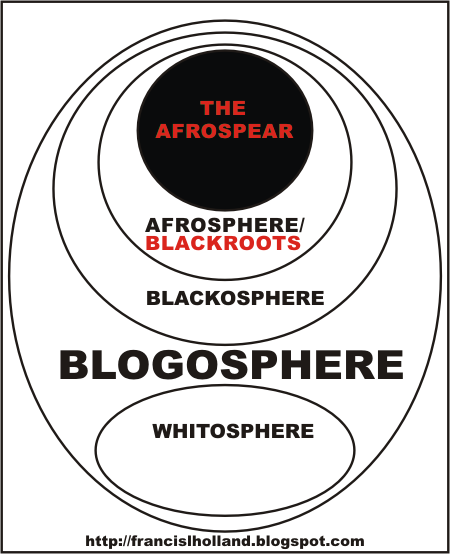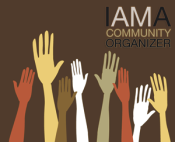
With the advent of the term "blackroots", there has been some confusion as to what difference, if any, exist between the terms "blackroots" and the "afrosphere," both of which terms describe a portion of the Blacks who participate in blogging. In fact, the terms are synonymous, as is explained and documented in this article.
As I observed at my blog back on June 13, 2007, in a comprehensive article entitled, "An Essay on AfroSpear Nomenclature: What We Call Ourselves and Why":
(2) The "AfroSphere" on the other hand, is the term that we have developed over the last few months to mean "Blacks on the internet, at Black blogs and websites, working for Black cultural, political and social self-determination, renewal and advancement and sharing generally similar goals, even if they do NOT know one another and and have NOT become part of an organization to pursue these goals in unity and collaboration. Being part of the Afrosphere reflects a choice to pursue the goals of Black self-deterimination, but without necessarily hav[ing] joined any particular group to do so as part of a collaborative. "An Essay on AfroSpear Nomenclature: What We Call Ourselves and Why," June 13, 2007.Now, compare that definition to the discussion and definition of the term "blackroots" that is offered by BlackProf.Com's "professor and [Black] blogger Spencer Overton, as discussed and quoted in YahooNews on February 14, 2008:
When you look at the definition of "Blackroots" offered by Professor Overton, as well as the groups, activities and political perspectives that he says comprise the "Blackroots", it is seems clear to me that "blackroots" and "afrosphere" are synonymous. In fact, Professor Overton says at the blackroots' BlackProf blog, in an article entitled, "A Significant Development for the Blackroots":Spencer Overton analyzed the rise of the Blackroots in a prescient post last May: While the "grassroots" are romanticized, in the past couple of decades Black politics has been hierarchical and limited by orthodoxy that constrains debate. An MLK/Malcolm model has defined the leadership styles and political philosophy of Black elected officials, non-elected figures like Jesse Jackson and Al Sharpton, organizations like the NAACP, and neo-Black Nationalist commentators and figures. Those not with the program essentially had the option of becoming Black Republicans. Older Black folks often complain about complacent black youth who don't vote, march, or otherwise live up to their model. Black blogs offer not only an opportunity to break from old orthodoxy, but to do so in a way that is flatter, and allows for more engagement through comments from readers (which are often more provocative than the posts)....
He cited the successful Fox News campaign as a "significant development" that fit into a larger effort to advance wired collaboration and force "transparency [to] hold Black elected officials more accountable." During the Fox fight in April, Afro-Netizen blogger Chris Rabb questioned how the CBC could cut deals and take contributions from Fox while neglecting its own constituency:Do these [CBC] folks know what the "netroots" is? Do they think it's just made up of by young, white college-educated geeks far removed from their own congressional districts? Do they know that the vast majority of Black voters who elected them are accounted for in the much larger population of African Americans who regularly access the Internet, approximately 20 million strong? Will they come to understand that the Black netroots community is presently a slumbering giant who, it seems, only the likes of a Fox News Channel can begin to awaken? Yahoo.Com
By looking at who comprises the "blackroots" and the "afrosphere," -- what our perspectives are and what we are doing -- it becomes apparent that these are but two synonymous terms for the very same "loosely organized" but "well-connected" "network" or "sphere" of people, perspective and activities. The term "afrosphere" derives from the term "blogosphere" (the "afro" part of the blogosphere) and gains its meaning in juxtaposition to the term "whitosphere". Meanwhile, the term "blackroots" is derived from the term "netroots", and its meaning is best understood in juxtaposition to the term "whiteroots", a term whose first published usage may have been by John Stodder at Althouse, on September 27, 2007.The past couple of months have produced a significant development among Black blogs. Many are working together to challenge conventional Black leadership. ( . . . )Afro-Netizen and Jack & Jill Politics, for example, separately criticized Jesse Jackson for speaking out against the Fox/CBC debate, and then deferring to the CBC the next week. Jack & Jill Politics disclosed to its audience that from 2003 to 2005, Fox News gave the CBC Foundation between $47,000 and $99,000, with 2006 numbers unavailable.
( . . . )
3) The Power of Collaboration: Despite the interactive and collaborative nature of the Internet, many Black blogs have remained relatively autonomous. We've provided links to occassional posts on other sites and included other black blog sites on our blogrolls, but our interaction has been limited, at least with regard to action. And autonomy is important--the wisdom of crowds comes not through parroting, but through autonomous decisionmaking. And we all have different interests. But the CBC/Fox Issue is an important step in the evolution of network effects--the power of a broad, flat, and well-connected blackosphere. Professor Spencer Overton, "A Significant Development for the Blackroots", BlackProf, May 1 2007.
Based on my first-hand knowledge of the history and usage of the term "afrosphere", and after having quickly reviewed the usage and definition of the term "blackroots", it is evident to me that"Blackroots" and "afrosphere" are two different names for the same loosely and informally organized sphere of online Black people, perspectives and activities.
Going forward, blackroots/afrosphere members may choose to agree to select one of the two of these terms to signify this concept, if only to facilitate the understanding of the news media, the public and government officials, as well as our own members. In the earliest days of the AfroSpear, we agreed to use the term "afrosphere" for this concept rather than "blackosphere" because many members believed that a term such as "blackosphere", derived from the term "Black" defined us only by our skin color. In comparison, the believed that, by adopting the term "afrosphere", we define ourselves in terms of our commitment to African-descendent-oriented people, politics, culture and history. In that sense, the terms "blackroots" and "afrosphere" differ in the same ethereal way that the terms "Black" and "African-American" differ.
For my part, Field Negro, Exodus Mentality and Asabagna convinced me that the term "afrosphere" and AfroSpear were preferable for our self-definition based on the argument above, and based on the need to select one term that all of us would use uniformly. Once having agreed with them on this point, I have always been happy with the term "afrosphere" and have never looked back. I am a member of the "loosely-organized" afrosphere as well as of the political blogger member group, governed and managed daily by consensus of the members, that is called the AfroSpear.
(3) The "AfroSpear" is our international, consciously and purposefully organized collaborative of Black bloggers and websites who develop online and offline organizations, forums, newspapers, messaging groups, chat rooms and other media to organize and mobilize the international Black Diaspora to pursue goals that will enhance and further our well-being, in all of the cities, towns, countries and continents where we live, throughout the world.
Being part of the "AfroSpear" requires that one have both adopted the goal of Black self-determination AND have decided to participate actively in this particular group to pursue these goals. Becuase the term AfroSpear has a very precise meaning, it necessarily includes substantive criteria for membership and its definition also requires that some people can only be non-members, because their views, advocacy and/or societal and cultural position simply have nothing to do with or are clearly adverse and contrary to the goals of Black poltiical, cultural and economic self-determination. An Essay on AfroSpear Nomenclature: What We Call Ourselves and Why, Francis L. Holland Blog, June 13, 2007.
To help distinguish between the term "afrosphere" and the group called the "The AfroSpear," and because "AfroSpear" is the name of a formal organization while "afrosphere" is not, therefore AfroSpear members have decided NOT to capitalize the word "afrosphere."Being part of the "AfroSpear" requires that one have both adopted the goal of Black self-determination AND have decided to participate actively in this particular group to pursue these goals. Becuase the term AfroSpear has a very precise meaning, it necessarily includes substantive criteria for membership and its definition also requires that some people can only be non-members, because their views, advocacy and/or societal and cultural position simply have nothing to do with or are clearly adverse and contrary to the goals of Black poltiical, cultural and economic self-determination. An Essay on AfroSpear Nomenclature: What We Call Ourselves and Why, Francis L. Holland Blog, June 13, 2007.
For those Black self-determination bloggers who have been blogging for at least three months and who wish to participate in a tightly-knit Afro-descendant Black bloggers' group, with over 130 duly admitted members from half a dozen countries and four continents, with daily e-mailing, press releases, a unified and automatically updating AfroSpear blog-list, and group organs such as AfroSpear in the News and AfroSpear Freedom Technology Christmas, I encourage you to consider applying for membership in the AfroSpear: http://groups.google.com/group/the-afrosphere/about
Sincerely,
Francis L. Holland, Esq.
The Truth About John McCain Blog
"One Love, One Nation Under an AfroSpear"

